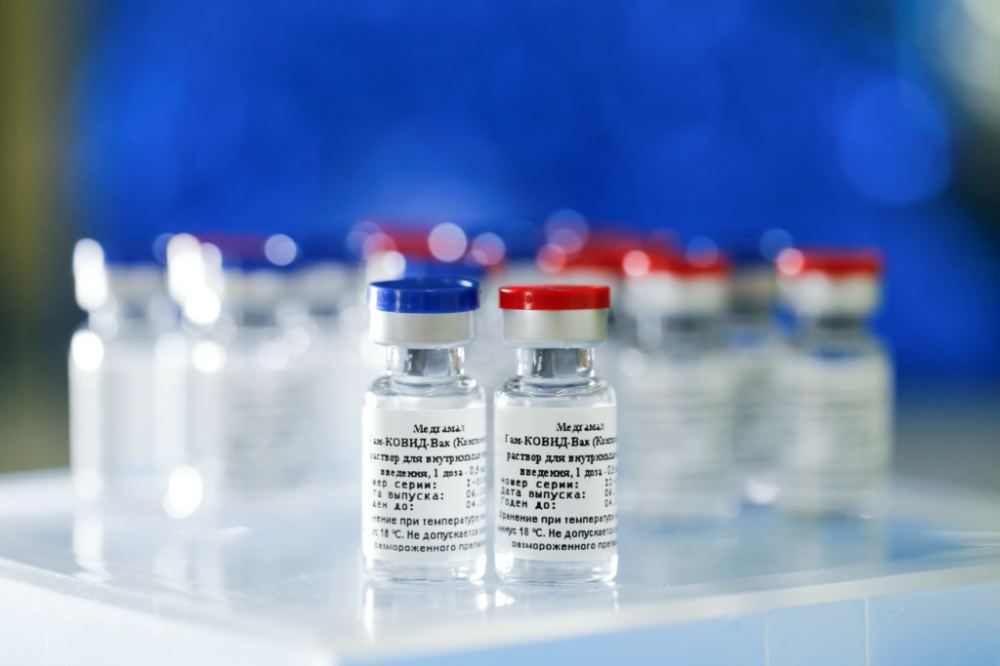London, UK
Reuters
Russia’s plan to roll-out its “Sputnik-V” COVID-19 vaccine even before full trials show how well it works is prompting concern among virus experts, who warn a partially effective shot may encourage the novel coronavirus to mutate.
Viruses, including the pandemic SARS-CoV-2, are known for their ability to mutate all the time – and often this has little or no impact on the risk posed to people.

A handout photo provided by the Russian Direct Investment Fund shows samples of a vaccine against the coronavirus disease (COVID-19) developed by the Gamaleya Research Institute of Epidemiology and Microbiology, in Moscow, Russia, on 6th August. PICTURE: The Russian Direct Investment Fund (RDIF)/Handout via Reuters
But some scientists are worried that adding “evolutionary pressure” to the pathogen by deploying what might not be a fully protective vaccine could make things worse.
“Less than complete protection could provide a selection pressure that drives the virus to evade what antibody there is, creating strains that then evade all vaccine responses,” said Ian Jones, a virology professor at Britain’s Reading University.
“In that sense, a poor vaccine is worse than no vaccine.”
CHINA APPROVES HUMAN TESTING FOR CORONAVIRUS VACCINE GROWN IN INSECT CELLS
China has approved human testing for a potential coronavirus vaccine cultivated within insect cells, local government in the southwestern city of Chengdu said on Saturday.
China is in a global race to develop cost-effective vaccines to curb the COVID-19 pandemic.
Using insect cells to grow proteins for the coronavirus vaccine – a first in China – could speed up large-scale production, the city government of Chengdu said in a notice on social media WeChat.
The vaccine, developed by West China Hospital of Sichuan University in Chengdu, has received approval from the National Medical Products Administration to enter a clinical trial, the notice said.
When tested on monkeys, the vaccine was shown to prevent SARS-CoV-2 infections with no obvious side-effects, the notice added.
Chinese scientists are already leading work on at least eight other potential coronavirus vaccines that have entered different stages of clinical trials.
Foreign players, including Germany’s BioNTech and Inovio Pharma in the United States, have also cooperated with local firms to test their experimental vaccines in China.
– ROXANNE LIU and YEW LUN TIAN, Reuters
Sputnik-V’s developers, as well as financial backers and Russian authorities, say the vaccine is safe and that two months of small-scale human trials have shown that it works.
But the results of those trials have not been made public, and many Western scientists are sceptical, warning against its use until all internationally approved testing and regulatory hurdles have been passed.
Russia said on Thursday it plans to begin a large-scale efficacy trial of the vaccine in a total of 40,000 people, but will also begin administering it to people in high-risk groups, such as healthcare workers, before the trial has produced any results.
“You want to make sure the vaccine is effective. We really don’t know that [about the Sputnik vaccine],” said Kathryn Edwards, a professor of paediatrics and vaccine expert in the infectious diseases division at Vanderbilt University School of Medicine in the United States.
She said that the risk of what a vaccine might do to a virus – in terms of fighting it, blocking it, or forcing it to adapt – is “always a concern”.
Dan Barouch, a specialist at Harvard’s Beth Israel Deaconess Medical Center in Boston, noted that mutation rates for coronaviruses are far lower than for viruses like HIV, but added: “There are many potential downsides of using a vaccine that doesn’t work. The risk that it [the virus] would mutate is a theoretical risk.”
Scientists say similar evolutionary pressure to mutate is seen with bacterial pathogens, which – when faced with antibiotics designed to target them – can evolve and adapt to evade the drugs and develop resistance.
Antibiotic resistance and the rise of superbugs, is described by the World Health Organization as one of the biggest threats to global health, food security and development today.
Jones stressed that vaccine-induced viral mutations are “a rare outcome”, and the greater the efficacy of the vaccine in blocking a virus’ ability to enter cells and replicate there, the lower the risk of it having an opportunity to circulate and “learn” how to evade antibody defences.
“If [a vaccine] is completely sterilising, the virus can’t get in, so it can’t learn anything because it never gets a chance,” he said. “But if it gets in and replicates…there is selection pressure for it to evade whatever antibodies have been generated by the inefficient vaccine. And you don’t know what the outcome of that will be.”
Meanwhile, World Health Organization epidemiologist Maria Van Kerkhove said on Friday that much more research is needed on the impact of mutations in the coronavirus,
“A special working group has been formed to identify mutations…and we’re looking at how we can better understand what the mutation means and how they behave,” she told a briefing in Geneva.
– with JULIE STEENHUYSEN in Chicago, US, STEPHANIE NEBEHAY and MICHAEL SHIELDS in Geneva, Switzerland.





